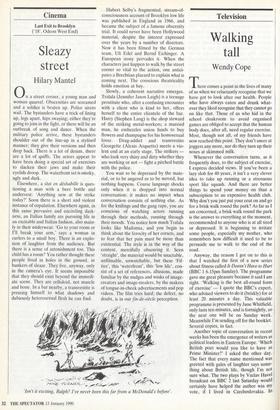Cinema
Last Exit to Brooklyn (`18', Odeon West End)
Sleazy street
Hilary Mantel 0 n a street corner, a young man and woman quarrel. Obscenities are screamed and a soldier is beaten up. Police sirens wail. The bystanders have a trick of lining up, legs apart, hips swaying; either they're going to join in the fight, or there will be an outbreak of song and dance, When the military police arrive, these bystanders shoulder out of the line-up in a stylised manner; they give their versions and then drop back. There is a lot of denim, there are a lot of quiffs. The actors appear to have been doing a special set of exercises to slacken their jaws and make their eyelids droop. The waterfront set is smoky, ugly and dark.
Elsewhere, a slut en deshabille is ques- tioning a man with a beer bottle and undervest: 'Anything new at the strike today?' Soon there is a short and violent instance of copulation. Elsewhere again, in this same pervasive and encircling dark- ness, an Italian family are pursuing life in an excitable and Italian fashion, also main- ly in their underwear. `Go to your room or I'll break your arm,' says a woman in curlers to a small boy. There is an explo- sion of laughter from the audience. But there is a sense of astonishment too. This child has a room? You rather thought these people lived in holes in the ground, in bunkers of sleaze. They live, anyway, only in the camera's eye. It seems impossible that they should exist beyond the immedi- ate scene. They are celluloid, not muscle and bone. In a bar nearby, a transvestite is pressing himself to what shadowy and dubiously heterosexual flesh he can find.
Hubert Selby's fragmented, stream-of- consciousness account of Brooklyn low life was published in England in 1966, and became the subject of a famous obscenity trial. It could never have been Hollywood material, despite the interest expressed over the years by a number of directors. Now it has been filmed by the German team, Uli Edel and Bernd Eichinger. A European irony pervades it. When the characters just happen to walk by the street corner so vital to the action, one antici- pates a Brechtian placard to explain what is coming next. The conscious theatricality holds emotion at bay.
Slowly, a coherent narrative emerges. Tralala (Jennifer Jason Leigh) is a teenage prostitute who, after a confusing encounter with a client who is kind to her, offers herself to the entire clientele of the bar. Harry (Stephen Lang) is the shop steward of the striking metal-workers; a married man, he embezzles union funds to buy flowers and champagne for his homosexual lover. Drug-addict and transvestite Georgette (Alexis Arquette) meets a vio- lent end at an early stage. The strikers who look very shiny and dirty whether they are working or not — fight a pitched battle with the police.
You wait to be depressed by the mate- rial, or to be angered or to be moved, but nothing happens. Coarse language shocks only when it is dropped into normal conversation; it makes no impact when conversation consists of nothing else. As for the knifings and the gang rape, you are conscious of watching actors running through their methods, running through their moods. You notice how much Tralala looks like Madonna, and you begin to think about the ferocity of her corsets, and to fear that her pain must be more than existential. The style is in the way of the content, mercifully obscuring it. Seen 'straight', the material would be unactable, unfilmable, unwatchable, but these 'Fif- ties', this 'waterfront', this low life', con- sist of a set of references, allusions, made familiar by the nudges and winks of image- creators and image-stealers, by the makers of tongue-in-cheek advertisements and pop videos. The film tries hard; the defect, no doubt, is in our fin-de-siecle perception.
Isn't it exciting, Ralph? I've never been this far from a McDonald's before'.










































 Previous page
Previous page